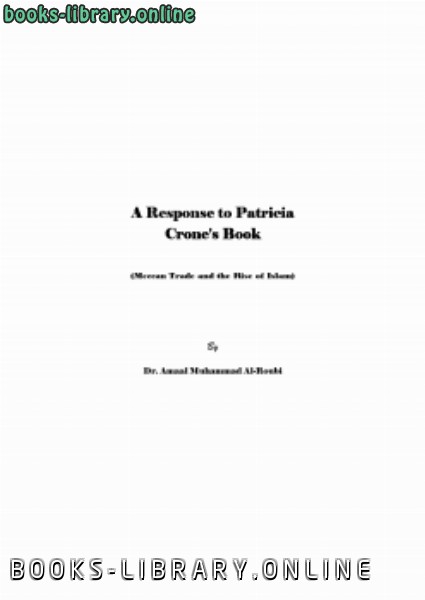📘 قراءة كتاب A Response to Patricia Crone s Book Meccan Trade and the Rise of Islam أونلاين


In the Name of Allah the Most Gracious, the Most Merciful.
Introduction
Patricia Crone's book Meccan Trade and the Rise of
Islam, Oxford, 1987 grabbed my attention, because it
tackled an era connected with "The History of the Arabs
before Islam", a course I am teaching to female students at
the Department of History, King Abdul-Aziz University,
Jeddah.
It is noteworthy that when I started reading through
this book, I was really shocked by what I read between the
lines and even overtly. What shocked me is that some
things were clear, but others were grossly incorrect and
hidden behind a mask of fake historical research, the
purposes of which are obvious for every professional
researcher. Therefore, as a scholar in the field, it was
necessary for me to respond to this book so that readers
will not be deceived and misguided by the great errors
introduced to them under the guise of historical research
or scholarship.
Crone is an orientalist who raised somewhat clever
questions, but her answers were misleading. Most of the
time, she deliberately used documented and logical
coordination in order to prove the opposite of what has
already been proven to be correct. It is a well-known fact
that the easiest way to pass an illogical issue and to make
readers swallow it is to begin by an assumption which
looks logical and persuasive, but is in fact essentially void.
Then from this false assumption, you jump to a set of
conclusions in order to make your case logical and
acceptable.
A lies in the speed at which false
assumptions are passed on skillfully and quickly so that
the reader will not pay attention to the issue of their
validity. Thus, the reader will be easily persuaded to
accept the findings.This technique is followed in historical
studies by some non-objective researchers. They insisted
on a certain idea, and to prove this idea they look for
evidence within a context which seems to be persuasive,
but in fact lacks validity.
Crone has changed and substituted some of the
words mentioned in historical texts. She introduced other
detached texts, and intentionally ignored the sources
which contradict her opinions; otherwise, her idea would
collapse. Also, she stated conclusions without mentioning
the references she depended upon. Furthermore, she
accused certain orientalists who disagreed with her of
trusting Islamic sources despite all their defects.
This persistent endeavor on her part aimed at
misgiving "Surat Quraysh" and "The Battle of Badr". The
later, according to the Holy Qur'an and other Islamic
sources, took place in the month of Ramadan. She also
changed actual historical locations; Mecca was changed
from its well known geographical and historical location.
She put the Ka'ba in the North of the Arabian Peninsula.
Moreover, she claimed that Prophet Muhammad, peace be
upon him (pbuh), appeared in "Balqa", in the farthest
North of the Arabian Peninsula, despite her emphasis that
the events related to the Prophet were predestined to take
place in the South.
A
I examined her many fallacies as an attempt to list
the most important issues for the purpose of deliberately
deceiving and misleading others. In this study, I discussed
all these issues stating the main themes as follows:
First, is Crone's rejection of historical and
geographical facts claiming that the Holy City of Makkah
is not situated on its original historical location. She
moved the location of Makkah on the map thereby
rejecting all indications made by Greek and Roman
authors to Makkah in the old ages.
Second, is Crone's denial of the Pilgrimage to
Makkah (the Ka'ba) before Islam. She claimed that they
went to three marketplaces near to Makkah: Ukaz, Dhul-
Majaz, and Majanna. She did not explain hermitage before
and in Islam, and in both cases she neglected
circamumbation and Talbiay (the pronouncement made by
Pilgrims to Allah during Hajj). In most cases, she
fabricated superficial logical coordination in order to
prove the opposite of what has already been proven. She
did not pay enough attention to the diverse sources which
contradict and completely undermine her opinion,
exploiting the lack of awareness of most European readers
regarding the rituals of the Pilgrimage.
Third, Crone refuses to recognize the role of Quraysh
in the international trade of the Orient. She insists on
marginalizing and limiting Quraysh’s role to local areas.
Often, she was about to recognize Quraysh’s international
trade, but intentionally refrained from doing so by using
vague sentences and without giving any explanation.
Moreover, she completely rejected the explanations of
A Response to Patricia Crone's Book
scholars on Surat Quraysh, on which the internationality of
Quraysh’s trade before Islam was very clear.
Fourth, Crone mistrusted the mission of the Last
Prophet, Muhammad (pbuh) by claiming that his mission
appeared in the North of the Arabian Peninsula and not in
the Holy City of Makkah. She did this in order to
undermine one of the most important bases of the Islamic
mission which started from Makkah. She claimed that
Quraysh resided in the North of Hejaz, not in Makkah,
though it is an undisputable and well-known fact that
Quraysh lived in Makkah.
حجم الكتاب عند التحميل : 734.5 كيلوبايت .
نوع الكتاب : pdf.
عداد القراءة:
اذا اعجبك الكتاب فضلاً اضغط على أعجبني و يمكنك تحميله من هنا:

شكرًا لمساهمتكم
شكراً لمساهمتكم معنا في الإرتقاء بمستوى المكتبة ، يمكنكم االتبليغ عن اخطاء او سوء اختيار للكتب وتصنيفها ومحتواها ، أو كتاب يُمنع نشره ، او محمي بحقوق طبع ونشر ، فضلاً قم بالتبليغ عن الكتاب المُخالف:
 قبل تحميل الكتاب ..
قبل تحميل الكتاب ..
يجب ان يتوفر لديكم برنامج تشغيل وقراءة ملفات pdf
يمكن تحميلة من هنا 'http://get.adobe.com/reader/'


 منصّة المكتبة
منصّة المكتبة 